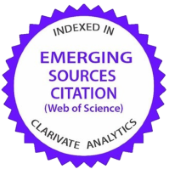Effects of High-Performance Work System on Job Satisfaction: The Mediating Role of Psychological Capital in the Hotel Employees of North Cyprus
DOI:
https://doi.org/10.29036/jots.v13i24.284Keywords:
High-Performance Work System, Psychological Capital, Job Satisfaction, Immigrant Worker,, TourismAbstract
Maintaining an effective workflow is crucial to obtain a mediating role among various concepts to boost the efficacy and performances of the employees in a workplace. The current study aims to investigate the effects of the psychological capital on the high-performance system and the job satisfaction levels of migrant employees in the hotel industry of Northern Cyprus. As objectives, the role of psychological capital in high-performance system and the job satisfaction levels of immigrant /migrant employees, and interactive manners among psychological capital, high-performance system, and the job satisfaction are considered. The setting of the current study is North Cyprus, a small, unrecognized island with a tremendously developed tourism and hospitality industry flourishing in the last decade. Regarding the methodology, the quantitative approach was adopted, and the convenience sampling method was chosen to get the facts and relations about PsyCap, JS and HPWS among immigrant employees at the hotels of North Cyprus. The data collection tools were questionnaires comprised of three parts, including different items adopted from well-known sources, and there were 400 migrant employees at 18 hotels in North Cyprus. The analysis was conducted via IBM statics covering SPSS and AMOS and included descriptive, factor, and statistical regression analyses. The results reveal that psychological capital has a mediating role between high-performance work systems and job satisfaction of migrant employees in the hotel sector of North Cyprus. Furthermore, the results highlighted the positive impact of psychological capital as almost all of the respondents were more eager to work under equal conditions brought by psychological capital factors. It is hoped that this study will posit influential data for obtaining efficient manners in workplaces and holds a sample for further academic studies.
Downloads
Downloads
Published
Issue
Section
License
Copyright (c) 2022 Journal of Tourism and Services

This work is licensed under a Creative Commons Attribution-NonCommercial-NoDerivatives 4.0 International License.
Journal of Tourism and Services (ISSN 1804-5650) is published by the Center for International Scientific Research of VŠO and VŠPP in cooperation with the following partners:
- Juraj Dobrila University of Pula, Faculty of Economics and Tourism, Croatia
- School of Business and Administration of the Polytechnic Institute of Setúbal, Portugal
- Szent István University, Faculty of Economics and Social Sciences, Hungary
- Pan-European University, Faculty of Business, Prague, Czech Republic
- Pan-European University, Faculty of Entrepreneurship and Law, Prague, Czech Republic
- University of Debrecen Faculty of Economics and Business, Hungary
- University of Zilina, Faculty of Operation and Economics of Transport and Communications, Slovakia
The publisher provides a free access policy to the Journal of Tourism and Services.





